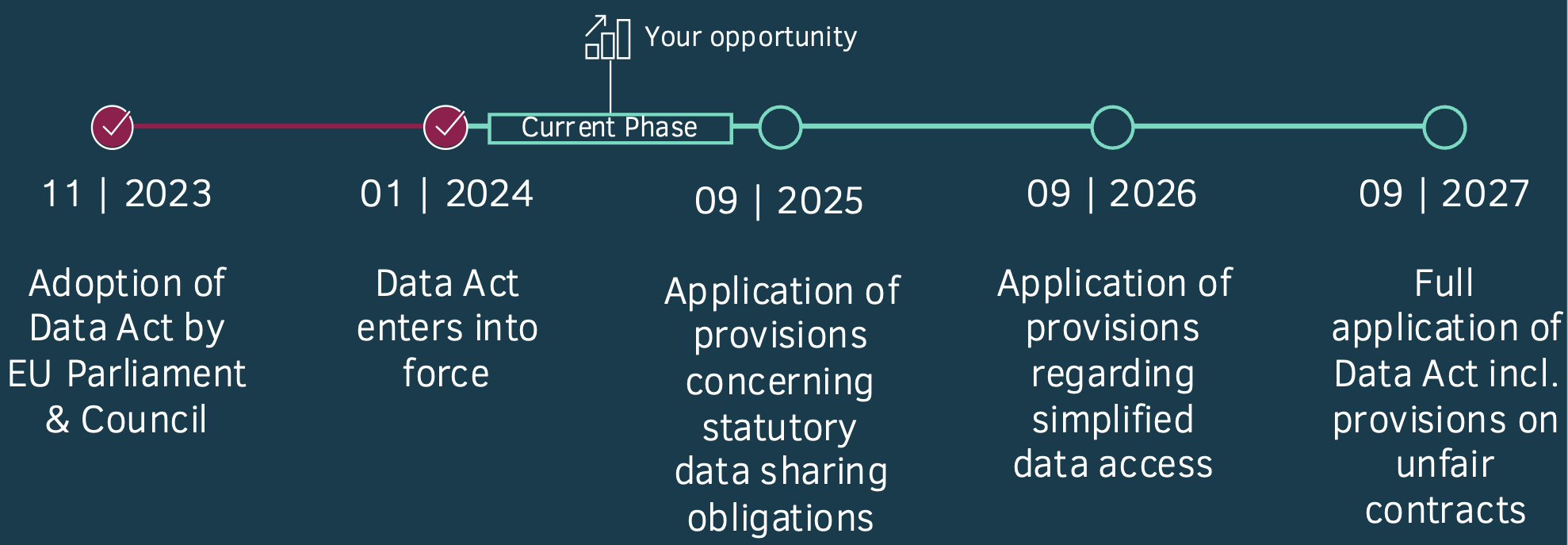Supercharging your business or leaving you in the dust?
The data revolution continues reshaping industries, both in regard to constant innovations, as well as in regard to new regulations, especially in the EU. The EU Data Act, applicable from September 2025 onwards, will have profound impacts on the way companies use data, promising to boost innovation, enhance data security, and above all, empower consumers. As you prepare for these game-changing rules about governing data access and sharing, the question is no longer whether you will adapt—but how. The EU Data Act promises unprecedented opportunities, but only for those ready to seize them. Are you?
Origins and Vision of the EU Data Act
The EU Data Act, proposed by the European Commission in February 2022, aims to break down data monopolies and promote a competitive digital market. By mandating that data generated by connected devices, meaning everything from mobile phones, to vehicles and smart meters, be made accessible, the Act encourages new services, innovation, and a more level playing field. For you, this means navigating new complexities around data ownership and usage rights. However, it also means unprecedented opportunities for growth: The European Commission is expecting 270 billion1 Euro of additional GDP due to the new data rules.

How will you balance challenges and opportunities?
While the EU Data Act brings the promise of innovation, it also brings significant changes to the status quo. For instance, OEMs will be required to share vehicle performance data with third-party service providers, such as independent repair shops. This could impact proprietary business models and intellectual property rights. In the energy sector, firms managing smart grids or energy storage systems may need to share sensitive operational data, raising concerns about privacy, data security, and competitive advantage. The fear of data fragmentation is real, as companies will need to carefully manage how, when, and with whom data is shared.
Solving the Compliance Puzzle
Complying with the EU Data Act is both a legal obligation and a strategic opportunity. Mobility companies must ensure data from connected cars, EVs, and charging stations is accessible to third parties while protecting business interests and consumer privacy. Similarly, energy companies must share grid data responsibly, balancing transparency with cybersecurity to avoid exposing critical infrastructure. A key aspect of the Data Act is promoting interoperability—ensuring systems can exchange and utilize data efficiently. For the mobility sector, this means seamless interaction between EVs, charging stations, and fleet management systems. Energy companies, meanwhile, must integrate smart grid and renewable energy data with third-party platforms to support energy optimization. By establishing robust data governance frameworks, sharing protocols, and fair data exchange agreements, businesses can ensure compliance while fostering collaborations that enhance operational efficiency and customer satisfaction.
How you can turn requirements into assets
Finally, the EU Data Act also empowers public authorities to request private sector data in emergencies, such as during natural disasters or energy shortages. For mobility companies, this could mean providing vehicle or traffic data to assist with emergency evacuations, while energy firms might need to share grid data to help manage energy crises. Ensuring that companies are ready to quickly and accurately respond to these data requests—without compromising business operations or exposing sensitive information—will require careful planning. Ultimately, it means you should have real time data analysis tools in place, in order to be able to share data if required in an emergency. While this initially represents a significant cost factor, once established, these tools become an asset: The European Commission estimates cost savings of up to 20% with real-time data analytics2.
Strategic Solutions: From compliance to opportunity
This is where specialist advice will be critical. accilium is deeply embedded in the mobility and energy sectors.
You’ll receive tailored solutions to help you navigate the EU Data Act. Our expertise includes building data-sharing frameworks that align with the Act while minimizing risks, and helping you develop innovative business models that capitalize on shared data.
For instance, accilium helps mobility firms explore predictive maintenance services using real-time vehicle data, while we support energy companies in optimizing energy distribution by leveraging smart grid data.
We also help companies in building secure data access protocols, helping you profit from a more secure data environment in general.
Finally, we are your go-to partner to develop your overall data strategy, as we leverage on our in-depth data expertise in combination with our industry knowledge.
Become Part of a Data-Driven Future

The EU Data Act is more than just a regulatory hurdle—it’s an opportunity to completely rethink your data strategy and unlock new potential. By acting now, you can position your company at the forefront of a data-driven economy. The road ahead may seem complex, but with the right guidance, you will not only comply with the new rules, but thrive under them. accilium is ready to guide your business through every step of this journey, from compliance to innovation. With the September 2025 deadline on the horizon, the time to act is now.
The EU Data Act is reshaping the future of mobility and energy. Get ready to embrace it.
Ready to learn more? Have a look at our data act presentation.

Peter Allan
Managing Partner
1 European Commission. (2022, February) Data Act Factsheet
2 European Commission. (2022, February) Data Act Factsheet

 ISO/IEC 27001:2013 certified
ISO/IEC 27001:2013 certified